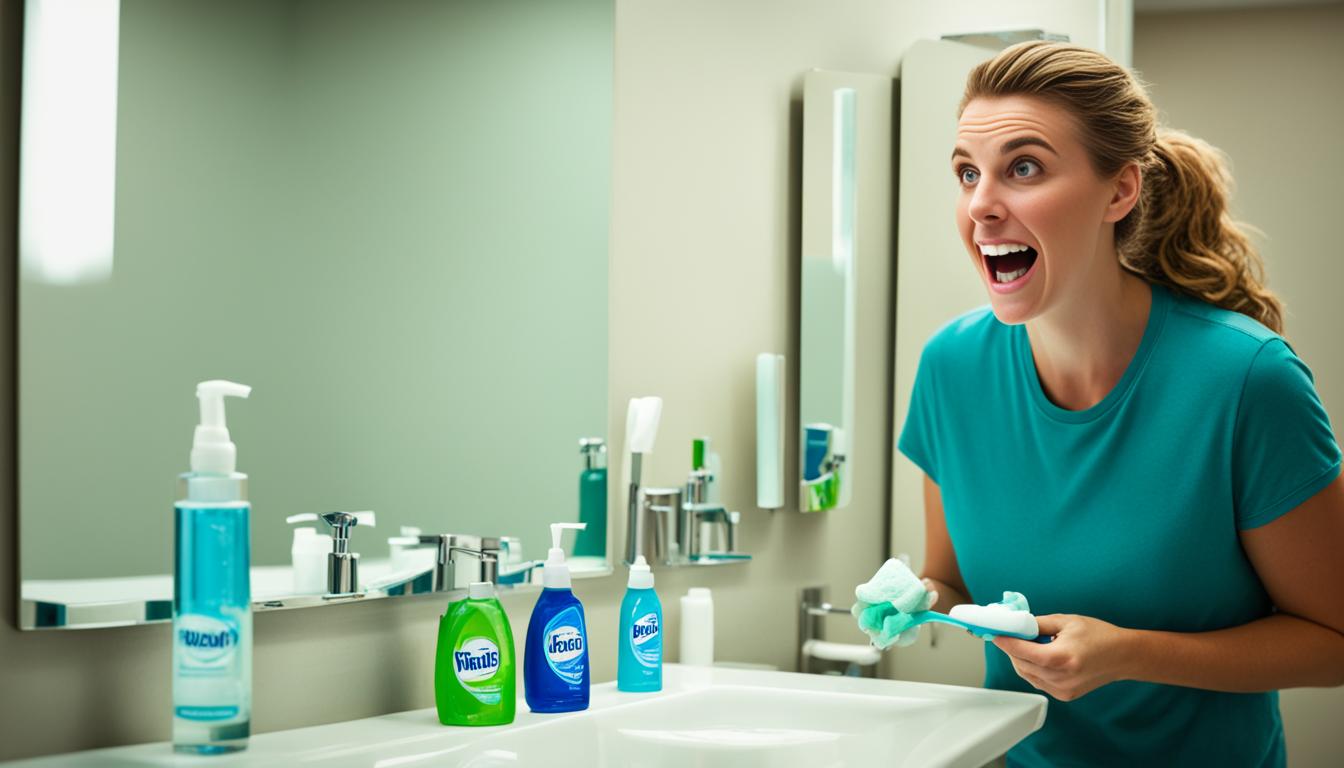Establishing a consistent oral hygiene routine is crucial for maintaining good dental health. One important aspect of this routine is brushing your teeth regularly. But how many times should you brush your teeth a day?
According to the American Dental Association (ADA), it is recommended to brush your teeth twice a day with fluoride toothpaste for at least two minutes each time you brush. This ensures that you thoroughly remove food particles and plaque, which contain bacteria that can lead to tooth decay and gum disease.
Brushing your teeth in the morning when you wake up and before bed at night is the best practice. In the morning, it helps to eliminate bacteria and residue that have built up overnight. Brushing at night removes food particles and helps prevent plaque from hardening into tartar while you sleep.
While brushing twice a day is the standard recommendation, it’s important to consider other aspects of dental care to maintain optimal oral health. Along with brushing, it is advised to floss daily, use mouthwash, eat a healthy diet, and visit the dentist for regular cleanings and checkups. These additional steps will help to further prevent tooth decay and gum disease.
By following a comprehensive dental care routine, you can enhance your oral hygiene and reduce the risk of dental problems. Remember, taking care of your teeth should be a priority, and adopting good dental habits contributes to overall well-being.
How Many Times Should You Brush Your Teeth a Day?
Factors That Impact Brushing Effectiveness
While brushing your teeth twice a day is recommended, optimal tooth brushing depends on several factors. It’s important to consider the best teeth cleaning schedule and recommended brushing frequency to maintain good oral health.
1. The Right Toothbrush
Using the right toothbrush is crucial for effective brushing. Choose a toothbrush with a size and shape that fits comfortably in your mouth. Opt for a soft-bristled toothbrush to avoid damaging your gums and tooth enamel. The bristles should be gentle yet effective in removing plaque and debris from your teeth.
2. Proper Brushing Technique
The way you brush your teeth also impacts its effectiveness. Follow these steps for optimal tooth brushing:
- Hold your toothbrush at a 45-degree angle to your gums.
- Use short back-and-forth or circular motions to brush all surfaces of your teeth.
- Pay attention to each tooth, including the front, back, and chewing surfaces.
3. Timing Matters
The timing of your brushing routine is another important factor. Wait at least 30 minutes after consuming acidic foods or drinks before brushing your teeth. Acidic substances can temporarily soften the enamel, and brushing immediately can cause damage. By waiting, you give your saliva a chance to neutralize the acid and remineralize the enamel.
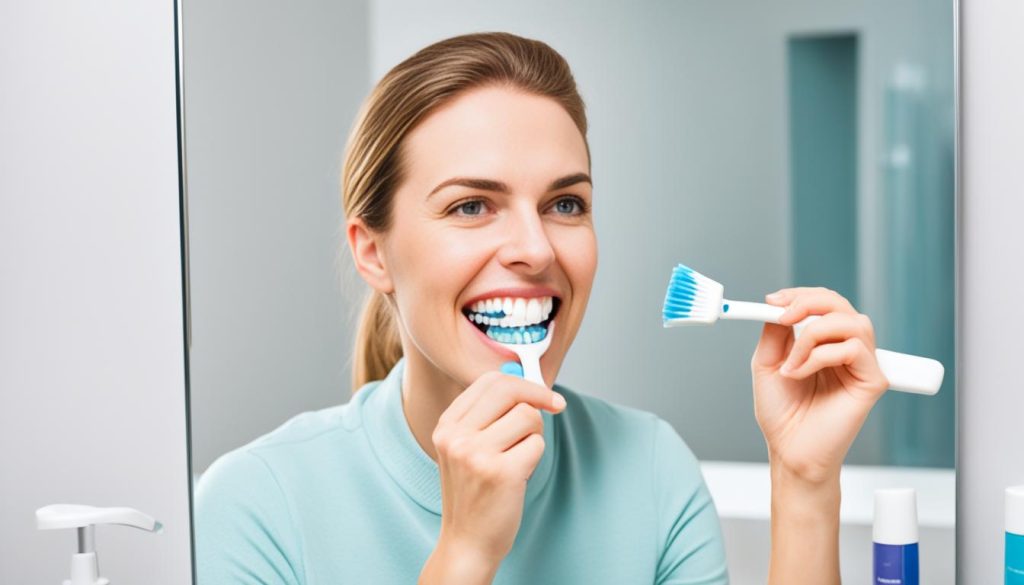
4. A Comprehensive Approach
Remember that regular brushing alone is not sufficient for optimal oral health. It’s essential to adopt a holistic approach to dental care. This includes maintaining a balanced diet low in sugar, flossing daily to remove plaque between teeth, and incorporating professional dental care into your routine. By addressing all aspects of oral hygiene, you can ensure the best results for your teeth and gums.
The Best Times to Brush Your Teeth
When it comes to maintaining good dental health habits, the frequency and timing of teeth brushing play a significant role in an effective oral care regimen. According to the American Dental Association (ADA), the best times of day to brush your teeth are in the morning when you wake up and at night before bed. Let’s explore why these timings are crucial for optimal dental care.
1. Morning Brushing: Start Your Day Right
Brushing your teeth in the morning is essential to remove bacteria and residue that have built up overnight. As you sleep, bacteria multiply in your mouth, leading to bad breath and potential oral health problems. By brushing in the morning, you eliminate these harmful bacteria, giving you a fresh start to the day and promoting better oral hygiene.
Additionally, brushing in the morning enhances saliva production, which aids in neutralizing acids produced by bacteria and protects tooth enamel. If possible, it is recommended to brush before breakfast to maximize the beneficial effects of saliva and allow the fluoride in toothpaste to strengthen and protect tooth enamel.
2. Nighttime Brushing: Maintain a Clean Smile
Brushing your teeth at night is equally vital to maintain dental health. Throughout the day, food particles accumulate in your mouth, promoting the growth of bacteria and the formation of plaque. Brushing at night helps remove these food particles, preventing plaque from hardening into tartar, which can lead to gum disease and tooth decay.
Before bed, it is especially important to thoroughly clean your teeth and gums to eliminate any lingering residue. By doing so, you protect your teeth while you sleep, reducing the risk of oral health issues and ensuring a fresh morning breath when you wake up.
3. Wait Time and After Breakfast Brushing
If you choose to brush your teeth after breakfast, it is advised to wait at least one hour after eating. This waiting period allows for saliva production and mineralization of tooth enamel, providing a protective barrier against acid attacks. Brushing immediately after consuming acidic foods or beverages can potentially damage the softened enamel, leading to enamel erosion over time.
Remember, brushing should be the first and last activity of the day for maintaining good oral hygiene. Whether you brush before breakfast or wait until after, following the recommended frequency of brushing, along with proper brushing technique, helps preserve your dental health and keep your smile shining bright.
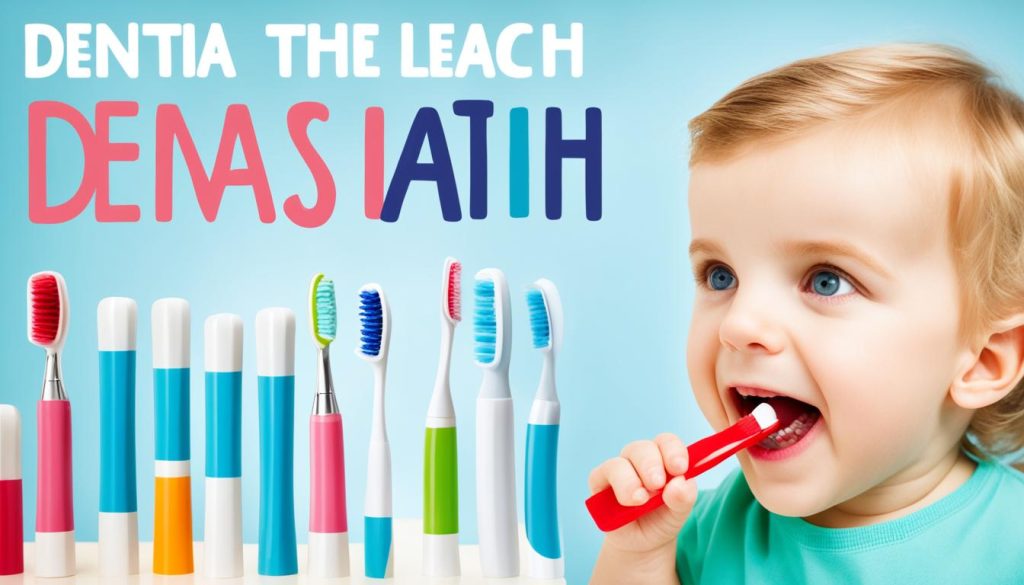
| Benefits of Morning Brushing | Benefits of Nighttime Brushing |
|---|---|
| Removes bacteria and residue | Eliminates food particles |
| Boosts saliva production | Prevents plaque formation |
| Protects tooth enamel from acid attacks | Reduces the risk of gum disease |
How Long to Wait After Eating to Brush Your Teeth?
Proper dental health habits extend beyond brushing after meals. Waiting for the right amount of time after eating can help protect your tooth enamel and support your oral health. According to the American Dental Association (ADA), it is recommended to wait at least 60 minutes after eating before brushing your teeth. This is especially important if you have consumed acidic foods or drinks, such as citrus fruits or soda.
Acidic foods and beverages can weaken the tooth enamel, which is the protective outer layer of your teeth, making it more susceptible to erosion and decay. After consuming acidic substances, it takes approximately an hour for saliva to help neutralize the acid and enable the enamel to recover. If you brush your teeth too soon after eating acidic foods, it can accelerate enamel loss and damage.
While waiting for an hour before bedtime after a late-night snack may seem inconvenient, it offers multiple benefits. Taking the time to digest your food properly can support better digestion and weight management. Additionally, waiting for an hour before brushing your teeth helps protect the health of your tooth enamel.
Benefits of Waiting After Eating to Brush
Maintaining tooth enamel protection is essential for oral health, and proper brushing habits contribute to its preservation. By waiting at least 60 minutes after consuming acidic foods or drinks before brushing, you allow your saliva to restore the enamel’s balance and minimize the risk of enamel erosion. This strategic waiting period helps to:
- Protect tooth enamel from acid erosion
- Support tooth decay prevention
- Prevent enamel loss
Image of a tooth with a toothbrush:
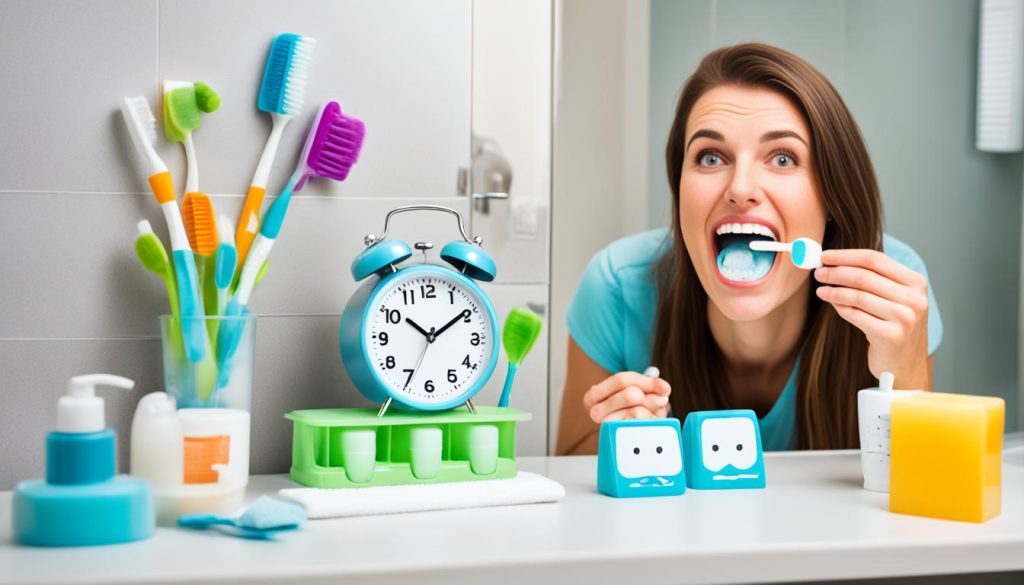
Wait Time after Eating for Optimal Toothbrushing
| Food/Drink | Wait Time Before Brushing |
|---|---|
| Acidic foods (citrus fruits, tomatoes) | At least 60 minutes |
| Soda, sports drinks | At least 60 minutes |
| Sugary treats or beverages | At least 30 minutes |
| Meals containing garlic or onions | At least 30 minutes |
| Coffee or tea | At least 30 minutes |
By following these guidelines and waiting for the recommended time after eating, you can take proactive steps to protect your tooth enamel and promote good dental health habits. Don’t let damaging acids compromise your oral health—give your tooth enamel the time it needs to recover before brushing your teeth.
When to Replace Your Toothbrush?
Proper toothbrush replacement is an essential aspect of maintaining good dental hygiene and an effective dental care routine. The American Dental Association (ADA) recommends changing your toothbrush or toothbrush head for electric toothbrushes every 3 to 4 months, or sooner if the bristles become worn down, bent, or broken.
Regularly replacing your toothbrush ensures that it remains effective in removing plaque and bacteria from your teeth. Frayed bristles can indicate that too much pressure is being applied during brushing, leading to potential gum damage. By replacing your toothbrush regularly, you can ensure a thorough cleaning and protect your dental health.
For those using electric toothbrushes, it is important to replace the brush head according to the manufacturer’s guidelines. This allows for optimal performance and plaque removal. Electric toothbrushes have been shown to be more effective than manual toothbrushes in removing plaque, making them a great option for maintaining dental hygiene.
Consider using a Spinbrush™ toothbrush for a thorough cleaning.
Spinbrush™ toothbrushes are designed to provide a comprehensive cleaning of your teeth and gums. Offering features like oscillating bristles and rotating heads, Spinbrush™ toothbrushes can effectively remove plaque and improve overall oral hygiene. Incorporating a Spinbrush™ toothbrush into your dental care routine can help you achieve a thorough cleaning and maintain optimal dental health.
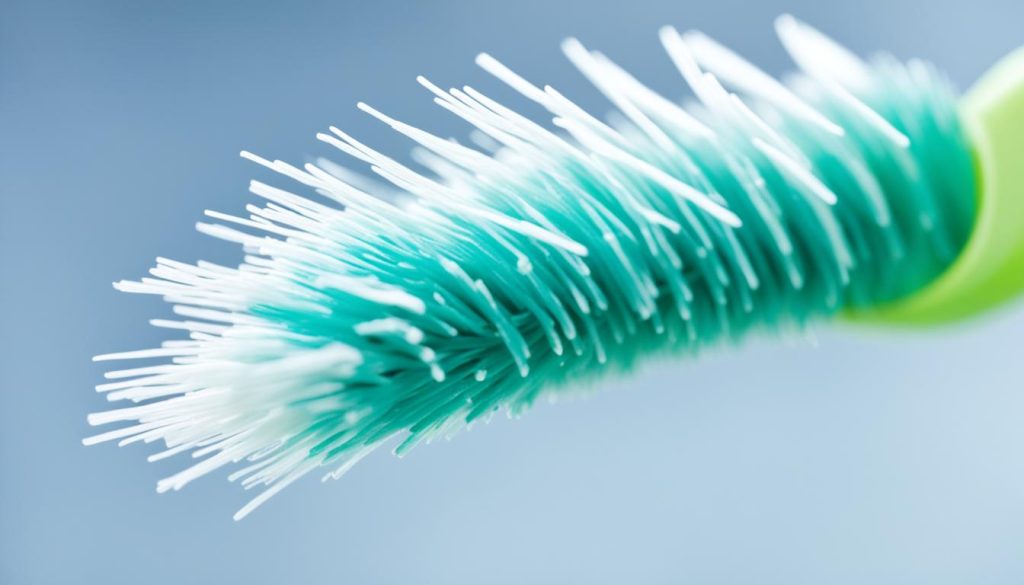
By adhering to the ADA’s recommendations for toothbrush replacement, you can ensure that your dental hygiene and dental care routine are effective in preventing tooth decay and gum disease. Regularly replacing your toothbrush, whether manual or electric, is a simple yet crucial step in maintaining optimal dental health.
The Importance of Dental Care Routine
Maintaining a consistent dental care routine is crucial for good oral health. In addition to brushing your teeth twice a day, here are some essential dental care habits, oral health tips, and dental hygiene tips to keep in mind:
- Floss daily: Regular flossing helps remove plaque and food particles from between your teeth and along the gumline, preventing tooth decay and gum disease.
- Drink plenty of water: Staying hydrated promotes oral health by promoting saliva production, which helps rinse away food debris and neutralize acids that can harm your teeth.
- Eat a healthy diet low in sugar: Consuming a balanced diet rich in fruits and vegetables, lean proteins, and whole grains reduces the risk of dental issues and supports overall oral health.
- Use mouthwash after brushing and flossing: Rinsing with an antimicrobial mouthwash can help kill bacteria and freshen your breath.
- Replace your toothbrush regularly: Over time, the bristles on your toothbrush can become frayed and less effective. Replace your toothbrush, or the head of an electric toothbrush, every 3 to 4 months to ensure optimal cleaning.
- Visit the dentist for cleanings and checkups: Regular dental visits are vital for maintaining optimal oral health. Dentists can identify and address any dental issues early on, provide professional cleanings, and offer personalized advice on oral hygiene.
Following these dental care habits helps prevent common dental problems such as tooth decay and gum disease. It’s important to integrate these tips into your daily routine to maintain optimal oral hygiene and keep your smile healthy.
The Role of Dentist in Oral Health
Regular visits to the dentist are essential for maintaining optimal oral health. Dentists provide professional dental care, including thorough cleanings and examinations, that are crucial for preventing and detecting dental issues. They play a vital role in supporting your overall oral health.
During dental checkups, dentists carefully assess your teeth, gums, and mouth for any signs of problems such as tooth decay, gum disease, oral cancer, or other dental issues. Through these regular examinations, they can identify and address any dental problems early on, preventing them from becoming more serious or requiring extensive treatment.
Professional dental care goes beyond what can be achieved with regular brushing and flossing alone. Dentists have specialized tools and techniques to remove stubborn plaque and tartar buildup that can lead to gum disease and tooth decay. They can also provide personalized advice on oral hygiene, recommending the best dental care routine and products for your specific needs.
Regular dental visits are typically recommended every 6 months, although the frequency may vary depending on your individual dental health needs. Your dentist will advise you on the appropriate interval for your checkups based on factors such as your overall oral health, risk of dental problems, and any ongoing treatments.
By prioritizing regular dental visits, you ensure that any potential dental issues are addressed promptly, reducing the risk of complications and the need for extensive dental work in the future. Dentists are valuable partners in your oral health journey, providing the expertise and guidance needed to maintain a healthy smile.
| Dental Checkups | Regular Dental Visits | Professional Dental Care |
|---|---|---|
| Prevent and detect dental issues | Recommended every 6 months | Thorough cleanings and examinations |
| Early intervention for dental problems | Individual frequency based on dental health needs | Tailored advice on oral hygiene |
| Reduce the risk of complications | Expertise and guidance for oral health | Specialized tools for plaque and tartar removal |
Conclusion
Establishing a regular tooth brushing routine is vital for maintaining optimal dental health. Following the recommendations of the American Dental Association (ADA), it is advisable to brush your teeth twice a day for at least two minutes each time, using fluoride toothpaste and employing proper brushing techniques.
Alongside these fundamental practices, it is essential to consider other factors that contribute to effective oral hygiene. Using the right toothbrush, waiting after consuming acidic foods, and ensuring regular dental care are all key aspects of maintaining dental health. By incorporating these habits into your daily routine, you can enhance your dental health and minimize the risk of tooth decay, gum disease, and other oral health issues.
Remember, dental health is not solely dependent on a consistent tooth brushing routine. It is important to floss daily, maintain a healthy diet, drink plenty of water, use mouthwash after brushing and flossing, replace your toothbrush regularly, and visit the dentist for cleanings and checkups. By prioritizing these habits, you are taking proactive steps to safeguard your oral health.

